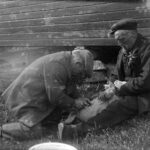22 November 1641: Snow falls at Elmswell (Driffield), and sheep farmers jostle for low ground and feed

Elmswell, Garton and Driffield, showing what I take to be a classic northern English medieval plot – high and low common and private pasture (Elmswell Wold and Elmswell Beck) linked by several paths (Ordnance Survey 1924).
Henry Best. 1857. Rural Economy in Yorkshire, in 1641. Ed. Charles Best Robinson. Durham: Surtees Society. Get it:
.Unedited excerpt
If an excerpt is used in the book, it will be shorter, edited and, where applicable, translated.
There fell (this yeare) a thinne snowe on Munday the 22nd of November, att which time our hogges weare in the Carre; the snowe continuinge still, the townesfolkes brought all their field sheepe and putte them into the Carre on Thursday-morninge the 25th of the same moneth; wherefore wee fetched away our hogges, and putte them into the Wandill closes, and wente and brought downe all our fielde-sheepe from the Spellowe, and layd them in the Bricke-close the first night, and then the next morninge wee putte them into the Carre, because the townesfolkes woulde not fetch theires out, and if it had then beene open weather, the Carre woulde not have lasted them three dayes to an ende; or if they had beene there all the waygate of the snowe, they woulde have troden it all to muck; but the weather continuinge att a certaine, without eyther increasinge or decreasinge, they remained there, and made a shifte to scrape for theire livinge till Sunday-morninge; for on Satterdaynight there came more snowe, and a frost with it, whearefore on Sunday-morninge our shepheard carryed a bottle of hey into the Carre, as much as wee thought they woulde eate readily, and shilled ours out from amongst the towne sheepe, and fothered them on our owne landes, and stoode by them till they had eaten it. The townes-folkes desired that every one might bringe hey proportionable to the number of theire sheepe, and then they brought a little of theire steare hey, and by this meanes our hey should have beene spente in fotheringe of other mens goods; whearefore on Sunday-night wee brought them into the West-hall East close, and there fothered them soe longe as the snowe lasted. Then weare our fatte sheepe in the Cunnigarth by themselves, and wee had thought to have wintered them there, whearefore wee putte three poore hogges to them, and beganne to fother them on Sunday night the 28th of November; and gave them that night but a little, but on Mundaymorninge wee gave them more, and they beganne to fall very sharpely to theire hard meate; but the hogges went snuffinge and snookinge from heape to heape, and woulde not fall to their fother till Munday-night. This weather still continuinge, wee brought our fatte sheepe (on Thursday-morninge the 2nd of December) and putte to the pyke of hey that was in the Westhall East close fenced in with an hedge, and in this corner was also a pease-stacke sette on the grownde; the hey was something course, and had gotten wette, soe that it was not alltogeather sweete, soe that wee weare affrayd that it woulde have deceived our fatte-sheepe, and that they woulde not have taken likinge to it, yett our hopes was that they woulde take some holde on the pease-stacke, and worke att it sometimes, which woulde bee a meanes to keepe them from loosinge what they had formerly gotten; but as for the three poore hogges, the course which wee tooke with them, was this: on the day time wee putte them into one close or other, and lette them eate snowe, and gette the weekinesse on the grownde, and att night wee fetched them in, and putte them into the hey-house, and lette them lye att the mowe-brest all night; and then in the morninge, if wee knewe of any banke-sides that lay against the sunne, wheare the sunne had melted away the snowe, wee tooke them and carryed them to them, and lette them pingle aboute, and worke theire all the day; and att night brought them in againe, and layd them in the howse; and this was the way which wee thought woulde bringe them over winter.
Comment
Comment
Can someone throw light on the microgeography – location of the carre/field names/ownership?
Something to say? Get in touch
Similar
 6 June 1641: Under a waning gibbous moon, armed with a penknife and sticky-willy unguent, a shepherd castrates Henry Best’s lambs at Elmswell (Driffield)
6 June 1641: Under a waning gibbous moon, armed with a penknife and sticky-willy unguent, a shepherd castrates Henry Best’s lambs at Elmswell (Driffield)
Comment
Comment
Do read what comes next, about mortar.
Something to say? Get in touch
Search
Donate
Music & books
Place-People-Play: Childcare (and the Kazookestra) on the Headingley/Weetwood borders next to Meanwood Park.
Music from and about Yorkshire by Leeds's Singing Organ-Grinder.


 Bluesky
Bluesky Extwitter
Extwitter